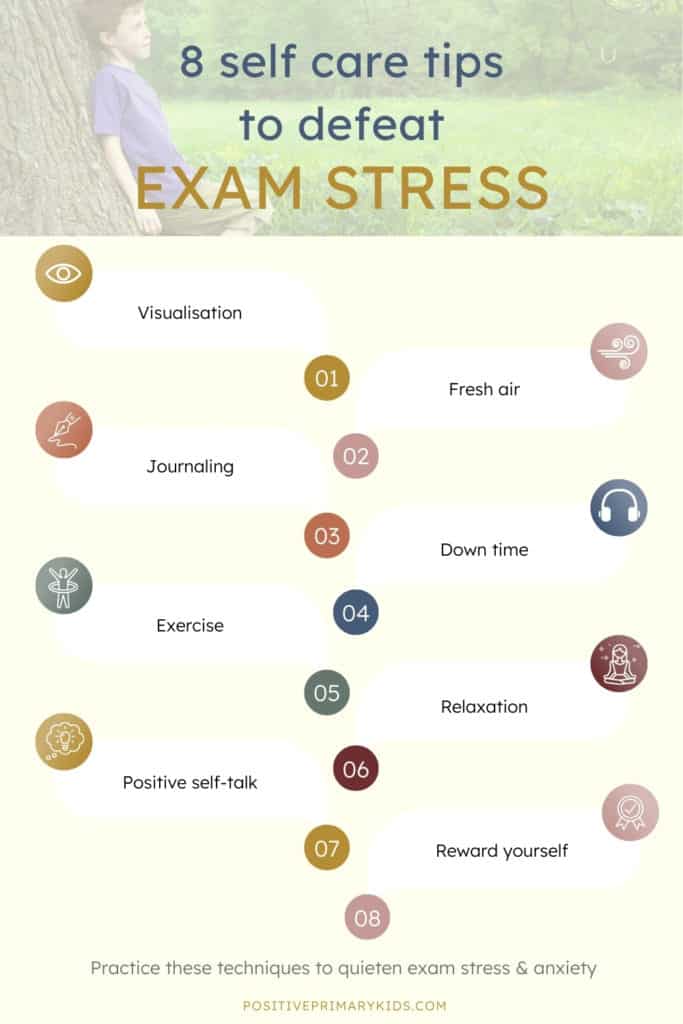Hoorah! You’ve made it to the final hurdle!
Whatever exams your child is due to take, it’s likely that they’ve been preparing for some time. Now it’s time for them to shine and show off how much they’ve learned. But no matter how much learning they’ve done, it’s normal for stress about exams to creep in. Experiencing some stress can be motivating, but too much can cause children to dramatically underperform.
During the week before exams, it’s a good idea to scale back on study time, ease the pressure and prioritise nurturing their physical, emotional and mental wellbeing instead.
If you missed last week’s post about exam technique you can read that here and download your free checklist – Top Last Minute 11 Plus Preparation Tips For Exam Day
In this post, we’ll start with a look at what you can do to support your child’s wellbeing on the days before exams before diving into 8 strategies for kids to take control of their stress through self care.
Affiliate Disclosure: This post may contain affiliate links. This means that I may receive a small commision – at no cost to you – if you make a purchase through these links. Thank you for your support!
Tips for parents to help children manage stress about exams
Healthy routine
Focussing on a healthy routine during the week before exams can have a very positive impact on wellbeing and managing stress levels.
You can plan for a healthy routine by ensuring that:
- Meals are regular and nutritious with plenty of fresh fruit and vegetables. Avoid processed junk food and sugary snacks, which are associated with increased stress and the dreaded sugar crash
- They stay hydrated throughout the day. A lot of kids need regular reminders to drink water
- Bedtime is early enough for quality, restful sleep, which is essential for memory retention and brain function
- They exercise regularly and get plenty of fresh air
- You make time to listen to any worries that they have
It’s also crucial to keep your own stress and worries in check. We all know that children are incredibly intuitive, and even if they don’t let on, they pick up on parental stress and add it to their own. Worrying about the responsibility of potentially ‘letting parents down’ won’t help them.
Tips for the final week
Don’t be tempted to cram in more learning. Brush up on some weak areas, and exam techniques but don’t do much more than that. Several studies, such as this, demonstrate that children who perceive a lot of pressure from parents with high expectations tend to underperform in exams. Let them know that you are proud of the hard work they’ve put in and remind them that they know so much more than they did before beginning their exam journey.
Keep family conversations positive, upbeat and varied this week – not centred entirely around the upcoming exams.
Don’t forget to have your travel planned out – rushing or running late on the day is another stress to avoid at all costs! Make sure that you know exactly where you are going, how you are getting there, how long it will take and where to park if you are driving.
The night before
Get organised the night before the exam by gathering everything they need to take in one place where it won’t get forgotten. Depending on what they’ve been told to bring, this could include sharpened pencils, an eraser, water, a snack plus anything like inhalers or glasses that they will need.
On the day
On exam day, get up early enough to have a nourishing breakfast. Slow-release carbohydrates like porridge, overnight oats, banana or wholemeal toast are good choices.
Arrive at the venue early, but not so early that anxiety builds up. Stay away from parents causing drama and panicking children. Finally, make sure that your child goes to the loo before the exam.
After the exam, be sure to celebrate your child’s efforts. Don’t linger around for the “What did you get for question 15?” type conversations because they can cause unnecessary worry. Reassure them that your love for them is the same regardless of their results. All their work will set them in good stead wherever they continue their education. They need to know that nothing terrible will happen if they don’t succeed and that life has plenty of other opportunities.

8 Self care tips for kids to defeat stress about exams
Share the following tips and techniques with your child so that they can begin to learn how to manage their own stress levels.
Tip 01 – Visualisation
Close your eyes and create a vivid, detailed mental picture of yourself walking into the exam room with confidence, sitting down calmly and answering each question with ease.
What can you see, hear, smell and feel? Visualising yourself as if it’s true and activating your senses this way prepares you to achieve your goals.
Tip 02 – Fresh air
Get outside and into the fresh air every day this week. 20% of the oxygen that you breathe is used by your brain to help it function. Take a walk in nature or just your neighbourhood. Having a change of scene and breathing fresh air helps you to think more clearly and focus your mind.
Tip 03 – Journaling
If you are feeling worried or stressed, don’t bottle it up. Those feelings will eventually erupt. Writing down your worries, thoughts and feelings gets them out of your head and helps reduce stress. When they are written down, it’s easier to judge if they are really important.
If you aren’t sure how to write about your feelings, try some creative writing for 5 or 10 minutes. Painting or drawing can also be helpful in reducing anxiety.
Tip 04 – Make time for fun
Do something that you really enjoy every day. Whether you love playing sport, getting stuck into a great book, visiting friends or dancing around your room, make a plan to do it and stick to the plan. Time spent on hobbies and leisure activities will nourish your mind, body and soul so your ready to tackle your exams.
Tip 05 – Exercise
There are plenty of reasons to exercise during the run up to exams. Exercising improves focus, memory and energy as well as boosting endorphins, which are hormones that boost energy and make you feel good. Physical activity helps fizzle out nerves and helps you sleep well at night.
Tip 06 – Relaxation
Relaxation techniques like listening to calming music, guided meditation and breathing exercises help to reduce stress by lowering your blood pressure and heart rate. Deep, slow breathing sends signals to the brain telling it to relax. Practicing relaxation regularly, especially before bed is very effective for managing anxiety and sleeping well.
Box breathing is a simple and very effective technique that was made popular by Navy SEALS. It quickly sharpens your focus, concentration and alertness.
How to do box breathing
- Inhale gradually through the nose for four seconds. Fill your lungs.
- Hold the air in your lungs for four seconds.
- Exhale gradually for four seconds. Empty your lungs.
- Hold your breath for four seconds.
Repeat for at least one minute!
Tip 07 – Positive self-talk
Self-talk is that constant stream of thoughts that runs through your head form morning to night. When these thoughts about yourself are kind and positive, they can reduce stress and boost confidence.
Tell yourself things like:
- I can do this
- I am smart
- I can do difficult things
- I am confident
You can download some free printable affirmation here to help you.
Tip 08 – Plan a reward!
You’ve worked so hard and made such a big commitment to your learning. Whether your ideal treat is an outing, pizza, the cinema, bowling or a sleepover, discuss what you could do to celebrate with your family and make a plan.
Time to shine!
Best of luck! 🙂








This is such a thoughtful post! Kids often face so much pressure during exams, and these self-care tips are gentle yet impactful.
Thank you! I appreciate you taking the time to leave a comment 🙂